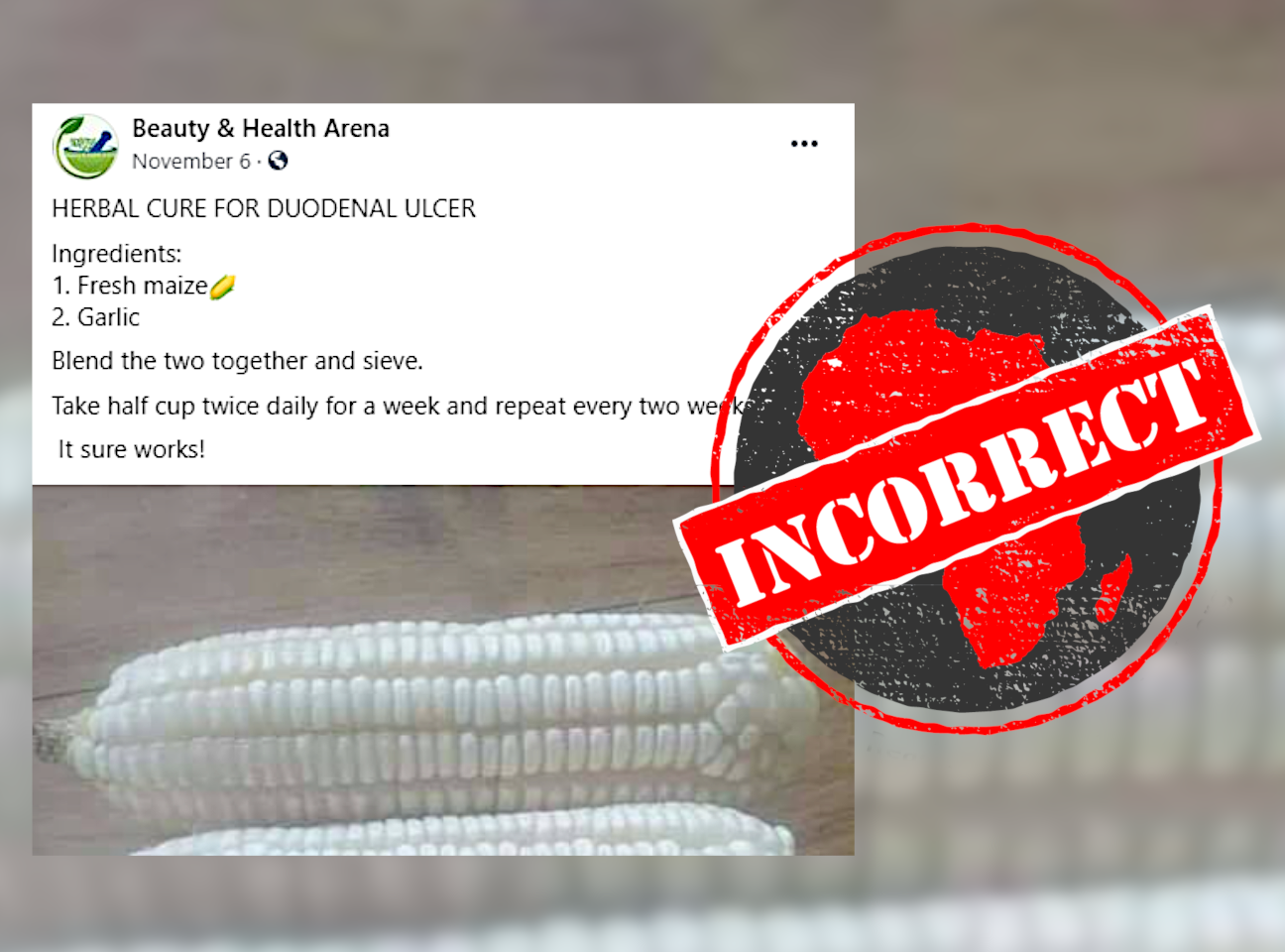A liquid made from blending fresh maize kernels and garlic is a “herbal cure for duodenal ulcer” that “sure works”, claims a message posted on the Nigeria-based Facebook page “Beauty & Health Arena”.
“Take half cup twice daily for a week and repeat every two weeks,” it says. The post shows a photo of maize cobs and garlic cloves.
Duodenal ulcers, also known as peptic ulcers, are open sores on the upper section of the small intestine – known as the duodenum – or the inside lining of the stomach.
Will this remedy cure them?

Jesse Otegbayo, a consultant gastroenterologist and professor of medicine at the University of Ibadan, told Africa Check that the maize and garlic mix would not cure peptic ulcers.
“This condition is mostly caused by bacteria in the stomach called Helicobacter pylori. Until the bacteria are killed by a group of antibiotics and acid-reducing medications, an ulcer cannot be cured,” he said.
Otegbayo said maize is mainly carbohydrate containing a protein called zein, which does not affect ulcers.
“Garlic is a cooking spice that stimulates the secretion of acid. The acid in the stomach is one of the causes of duodenal ulcer.”
He added that when people with duodenal ulcers eat, chemicals in the duodenum that neutralise gastric acid are secreted, making the person feel some relief.
“People with symptoms of ulcers should see a doctor, because not every stomach pain is associated with an ulcer,” he said. – Catherine Olorunfemi
“Take half cup twice daily for a week and repeat every two weeks,” it says. The post shows a photo of maize cobs and garlic cloves.
Duodenal ulcers, also known as peptic ulcers, are open sores on the upper section of the small intestine – known as the duodenum – or the inside lining of the stomach.
Will this remedy cure them?

Ulcers mostly caused by bacteria
Jesse Otegbayo, a consultant gastroenterologist and professor of medicine at the University of Ibadan, told Africa Check that the maize and garlic mix would not cure peptic ulcers.
“This condition is mostly caused by bacteria in the stomach called Helicobacter pylori. Until the bacteria are killed by a group of antibiotics and acid-reducing medications, an ulcer cannot be cured,” he said.
Otegbayo said maize is mainly carbohydrate containing a protein called zein, which does not affect ulcers.
“Garlic is a cooking spice that stimulates the secretion of acid. The acid in the stomach is one of the causes of duodenal ulcer.”
He added that when people with duodenal ulcers eat, chemicals in the duodenum that neutralise gastric acid are secreted, making the person feel some relief.
“People with symptoms of ulcers should see a doctor, because not every stomach pain is associated with an ulcer,” he said. – Catherine Olorunfemi
Republish our content for free
For publishers: what to do if your post is rated false
A fact-checker has rated your Facebook or Instagram post as “false”, “altered”, “partly false” or “missing context”. This could have serious consequences. What do you do?
Click on our guide for the steps you should follow.
Publishers guideAfrica Check teams up with Facebook
Africa Check is a partner in Meta's third-party fact-checking programme to help stop the spread of false information on social media.
The content we rate as “false” will be downgraded on Facebook and Instagram. This means fewer people will see it.
You can also help identify false information on Facebook. This guide explains how.





Add new comment